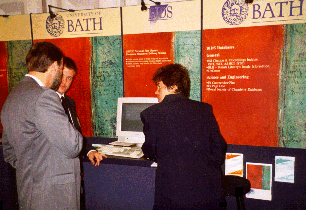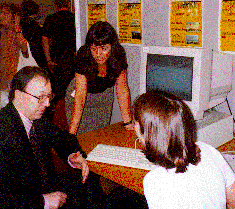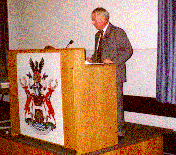Libtech 96
 The exhibition was opened on the 4th of September by Jack Schofield, the editor of the online section of the Guardian newspaper. He gave a short speech, which included a witty section on the hassle caused by the frequent version updating of software; software where updates appeared every few weeks he named "dribbleware"!
The exhibition was opened on the 4th of September by Jack Schofield, the editor of the online section of the Guardian newspaper. He gave a short speech, which included a witty section on the hassle caused by the frequent version updating of software; software where updates appeared every few weeks he named "dribbleware"!
Also at the opening, the University announced the award of 462,000 pounds to the University of Hertfordshire, Cimtech Ltd and International Imaging Ltd to set up a digitisation centre that will convert more than one million pages of printed text a year into 'electronic libraries'. The initial development of the centre is funded under the eLib programme.
 The exhibition proper consisted of stands from many of the commercial suppliers of CD-ROMs and all sorts of other equipment for the library community, from shelving to security barriers. This year the exhibition was bigger than ever, and spilled over from the giant marquee outside the main University building into the North Hall. The stage of the hall was taken up by a delightfully recreated cybercafe, with real chic tables and stands, genuine cappuccino, several PCs (on many of which Ariadne was in evidence) and a token cyberpunk with red and green hair…
The exhibition proper consisted of stands from many of the commercial suppliers of CD-ROMs and all sorts of other equipment for the library community, from shelving to security barriers. This year the exhibition was bigger than ever, and spilled over from the giant marquee outside the main University building into the North Hall. The stage of the hall was taken up by a delightfully recreated cybercafe, with real chic tables and stands, genuine cappuccino, several PCs (on many of which Ariadne was in evidence) and a token cyberpunk with red and green hair…
In addition to the exhibition, there were many senimars and presentations spread over the two days. It was somewhat frustrating, with so many sessions in parallel, to pick out which ones to go to in preference over others; here a few notes from some of those.
Electronic Journals
Some of the projects from the Electronic Journals section of the eLib programme gave presentations in a full afternoon session, which was attended by over 100 delegates. There were presentations from JILT, Internet Archaeology, Electronic Seminars in History, Deliberations, the Open Journal project and Sociological Research Online. Each of the projects described the background to their project, the problems and decisions involved in mounting their journals online in the way they have done, and all reported a healthy number of people using their resource. Dan Fleming from the formations project (one of the projects from the pre-prints section of the eLib programme) gave an interesting talk which illuminated many of us on what a pre-print system was, and its relevance to electronic/on-line journals.
EARL Council Meeting
It was interesting to attend this meeting of the Project EARL consortium - which aims to provide electronic access to resources in public libraries. Public Libraries can often seem the poor relation to academic libraries when it comes to network access. However the enthusiam is not lacking as shown by the presentations, and hopefully if the present Millenium bid is sucessful, neither will the funds. A presentation about the Millenium bid was made by Martin Dudley (Project Manager) and David Iron of Logica. The meeting was also addressed by Sir Charles Chadwick Healey, Chairman of the company, Information for All, which has been set up to administer the bid. Presentations were also made about a number of task groups in the EARL consortium, covering Business information, Training and policy issues among others. More task groups presented in the afternoon.
Bailer AGM
 As with all AGM's, the BAILER meeting included a review of the past year's activities, with an emphasis on the value of a collaborative organisation. A particular point of debate was the re-allocation of the research studentships to the British academy, an the loss of partial laboratory status - how were the schools to combat any threat to the number of their studentships? The only answer the meeting came up with, was to simply be better! After the formal business was finished, the meeting was addressed by Nicky Gardener, Director of Educational services, University of Ulster. Her theme was "Is the electronic library the latest manifestation of the 'universal' library". The text of her speech will be available via the BAILER www server.
As with all AGM's, the BAILER meeting included a review of the past year's activities, with an emphasis on the value of a collaborative organisation. A particular point of debate was the re-allocation of the research studentships to the British academy, an the loss of partial laboratory status - how were the schools to combat any threat to the number of their studentships? The only answer the meeting came up with, was to simply be better! After the formal business was finished, the meeting was addressed by Nicky Gardener, Director of Educational services, University of Ulster. Her theme was "Is the electronic library the latest manifestation of the 'universal' library". The text of her speech will be available via the BAILER www server.
On-Demand Publishing for Learned Materials
This session was given twice at Libtech - quite a marthon as each session lasted just under 3 hours. Several eLib projects presented - Patron (University of Surrey), Acorn (Loughborough), ERCOMS (De Montford - lead), ERIMS (Oxford), eOn (East London), Eurotext (Hull), Only Connect (Liverpool John Moores), Project Phoenix (Huddersfield), RESIDE (UWE - and at the time only 3 days old!) and SCOPE (Stirling- lead). From project plans we can look forward to a glut of model agreements for electronic copyright in a couple of years!
Guest Lecture: Mel Collier
Mel Collier is the director of the International Institute for Electronic Library Research (IIELR), and was asked to give this years Guest Lecture. His theme was electronic library strategy; the thought-provoking lecture, will be published in the November issue of the Library Association Record.
 Mel gave an overview of the development of the IT strategy of De Montford University, showing how this split campus University had evolved a modern, fluid strategy to cope with the increasing influence and necessity of IT. He showed how a digital library strategy evolves from the development of an information strategy, with the key factors of teaching, computing, information and library policies being brought together.
Mel gave an overview of the development of the IT strategy of De Montford University, showing how this split campus University had evolved a modern, fluid strategy to cope with the increasing influence and necessity of IT. He showed how a digital library strategy evolves from the development of an information strategy, with the key factors of teaching, computing, information and library policies being brought together.
He then gave a detailed rundown of the IIELR, it's formation and what projects it was currently involved with (a rather long and impressive list, including several eLib projects such as Helix, with lots of large figures in the budget column!). He then briefly detailed a somewhat technical arrangement with IBM for integrating the IIELR with an advanced intranet like system.
The rest of the lecture was mainly concerned with the evolution of digital libraries on a global scale (which made a refreshing change from most lectures of this nature, which unfortunately usually concentrate exclusively on UK digital / electronic libraries developments); the printed lecture will be well worth waiting for.
